How Much Does It Cost to Charge an EV?
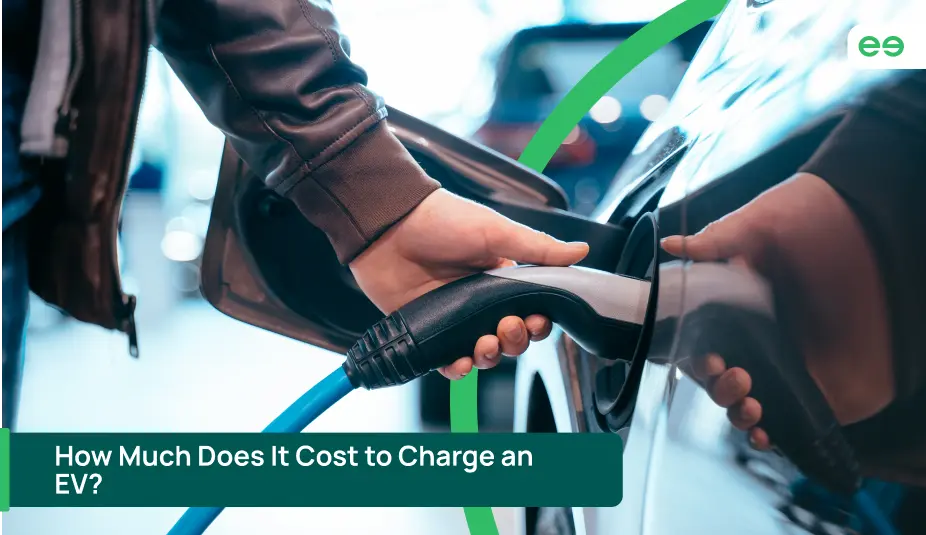
Fuel prices in the UK are rising, and the government plans to phase out petrol and diesel vehicles in the coming years to save fuel and control air pollution. Ride-hailing platforms like Uber are also encouraging PCO drivers to go electric through Uber’s EV assistance programme, aiming for a fully electric fleet in London by the end of 2025.
The Uber EV assistance programme is designed to help PCO drivers easily switch to EVs through Uber’s partner PCO car hire and rent-to-buy plans, which offer electric vehicles at discounted rates.
As more drivers switch to electric vehicles, it’s important to understand how much it costs to charge an EV. While charging an electric car is significantly cheaper than refuelling a traditional car, the actual cost of charging depends on several factors, including battery size, charger type, and charging location.
In this guide, we’ll break down EV charging costs, compare them with fuel prices, and offer some helpful EV charging tips for PCO drivers in London.
Article Highlights
This article covers:
- The costs of filling up a fuel tank and charging an EV
- Cost comparison of different EV charging options
- Reasons behind the high costs of rapid chargers
- Tips for PCO drivers
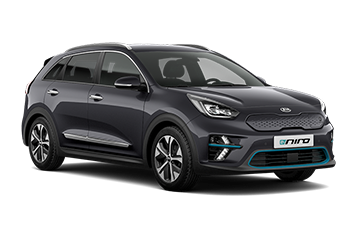




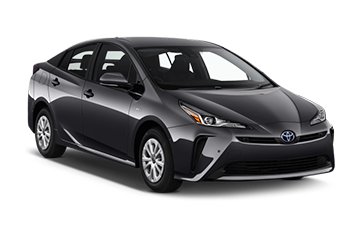
The Cost of Petrol and Diesel
At the time of writing this article, petrol costs around £1.34 per litre, and diesel is approximately £1.41 per litre. If your petrol or diesel car has a 55-litre tank and provides 7 miles per litre, then you’re spending about £0.2 for every mile you drive.
On top of that, if your vehicle doesn’t meet emission standards, you’ll need to pay £15 per day for the Congestion Charge in central London.
These costs can add up over time and significantly impact your overall profits. On the other hand, EVs are exempt from these daily charges, making them a much more affordable option for PCO drivers working in and around London.
The Cost of Charging an EV
EV charging costs depend on where and how you charge. Below are the most common options available to EV drivers in London:
Home Charging
A home charging unit is the most economical option for EV drivers because residential electricity is cheaper than commercial electricity at public or rapid charging points.
- The installation cost for a wall box charger ranges between £600 and £1,000. Though the upfront installation cost is high, it’s a one-time investment that pays off over time.
- If your EV has a 60kWh battery and the average UK electricity rate is 25.73p per kWh, a full charge at home will cost around:
60kWh × £0.2573 = £15.44
If you have access to an off-peak tariff (00:00 to 07:00) at 8.5p per kWh:
60kWh × £0.085 = £5.10
That’s just over 7p per mile if your EV provides 217 miles per charge.
For PCO EV drivers in London, the home wall box charger could be a real game-changer, as it can save you a lot of money on fuel.
Looking for a reliable electric vehicle for PCO car hire? Fleeto offers competitive rates on the latest EVs, including the Kia Niro EV, MG5, Mercedes EQE, and more. All vehicles are fully licensed, brand new, and road-ready. Enjoy lower running costs, zero ULEZ charges, and a smooth driving experience, perfect for PCO drivers who want to maximise earnings and drive in comfort.
Public Charging
You will rely on public charging stations if you don’t have a home charger. There are three types of public chargers. Here’s how much they cost:
- Standard Public Chargers: They range between 7kW and 22kW and cost 40-50p per kWh. Fully charging a 60kWh battery through a 7kW charger will take around 8-9 hours, while a 22kW charger will take about 3 hours. The cost of charging an EV at standard public chargers is usually between £24 and £30.
- Rapid Chargers: They’re also known as DC fast chargers or Level 3 chargers. The cost of a rapid 50kW charger is usually between 65p and 80p per kWh. A full 60kWh charge on a fast charger will cost you around £39 to £48 and take about 1 hour.
- Ultra-Rapid Chargers: An ultra-rapid charger costs even more. These chargers can go over 100kW and deliver 80% charge in less than 30 minutes at around £0.85 – £1.20 per kWh, costing around £51 – £72 for a full charge.
There is a 20% VAT on public charging, which is significantly higher than 5% applied to home electricity.
For PCO drivers, a full charge typically lasts an entire 8-hour shift. However, if you need to top up during the day, rapid chargers are the best option. They can charge your vehicle up to 60% in a 30-minute break and cost only £20 – £30.
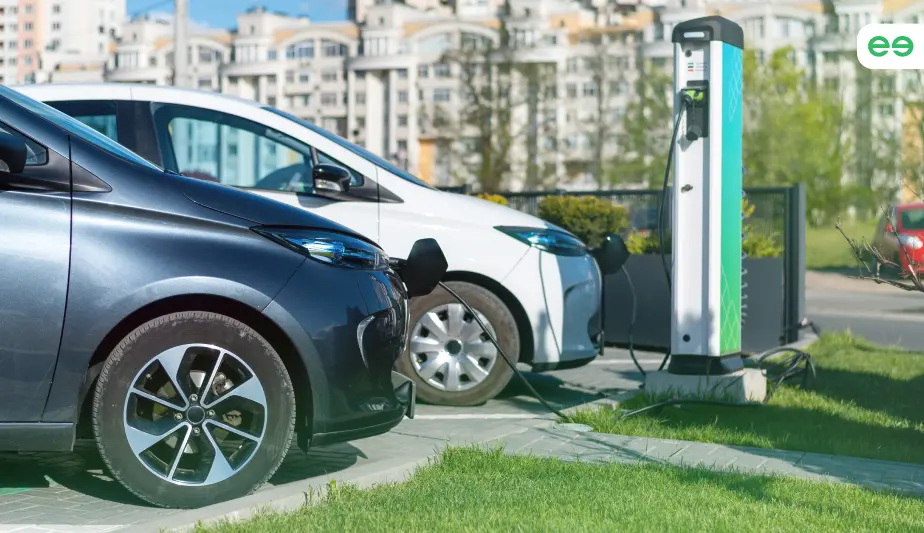
On-Street Lamppost Charging
Lamppost chargers are integrated into existing streetlights to save space and reduce installation costs. These chargers range from 3kW to 5kW and are suitable for overnight charging. The average cost is 43p per kWh, meaning a full 60kWh charge costs:
60 × £0.43 = £25.80 + 20% VAT = £30.96
- You need a standard Type 2 cable to use these chargers.
- The payments are made via mobile apps or contactless methods.
PCO drivers in London can use apps like Zapmap to find their nearest lamppost chargers. The app can also help you check the charger’s availability.
EV Charging Cost Comparison
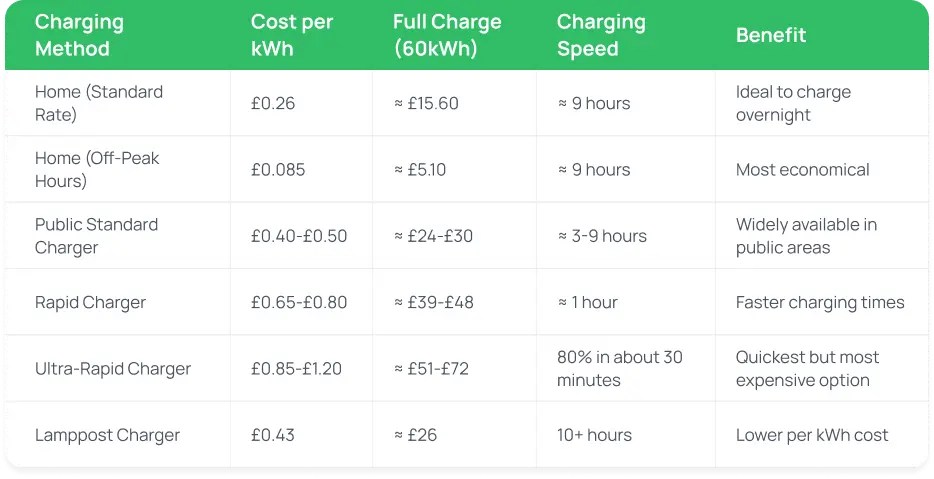
EV Charging Tips for PCO Drivers
Charge During Off-Peak Times (00:00 to 07:00)
Charging during off-peak hours can slash your charging costs by more than half. Some drivers pair their smart chargers with off-peak tariffs to automatically charge EVs when electricity is the cheapest.
Plan Ahead
Use apps like Zapmap to find available charging stations. The app also offers price comparison of different charging stations and updates about free EV charging stations in London, allowing you to pick the most affordable option. You can plan your next ride there and take a small break for refreshment, and top up your EV.


Monitor Battery Health
Although ultra-rapid chargers are fast and can minimise downtime, their frequent use can reduce the battery’s life, and they also cost more. The best option is to charge your vehicle overnight and only use the rapid chargers to top up during the shift when needed.

Start Earning Today.
Conclusion
Charging EVs through home or slow chargers is much more affordable. Even without off-peak hours, you could halve your per-mile costs compared to petrol or diesel cars. Couple this with daily Congestion Charge savings, and you could save several hundred pounds every month. Just make sure you charge your EV in breaks or overnight to maximise your availability, because in the PCO industry, the more available you are, the more you earn.
Frequently Asked Questions
Is charging an EV expensive in the UK?
It depends on where you charge your EV. Charging at home overnight or using standard public chargers is relatively cheaper, while the fast or ultra-rapid chargers cost more.
Are there any free EV charging stations in the UK?
The UK does have free EV charging points. However, they are rare and you will need to use tools like Zapmap to find them.
Do electric cars come with a home wall box charger?
No, you will have to buy a wall box charger separately to charge your car at home.
Suggested Blogs
To get more information like this
Subscribe to our newsletter
Get on the Road Fast. Book Your EV Today with Fleeto!
We make it easy for you to drive and earn in a fully electric vehicle. Our simple booking process is designed to save you time: choose your EV, show your documents, and we’ll take care of the rest. No delays, no confusion, just a smooth start with a brand-new electric PCO car.
